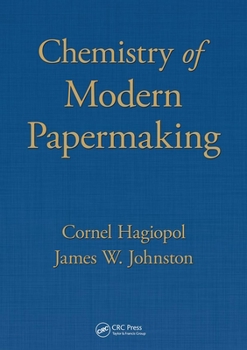Chemistry of Modern Papermaking
Chemistry of Modern Papermaking presents a chemist's perspective on the papermaking process. With roughly 3% of the mass of a paper product invested in water-soluble chemicals, paper makers can adjust the speed and efficiency of the process, minimize and reuse surplus materials, and differentiate a paper product as required by specific customers. With research and development scattered across academic journals or the proprietary information of a variety of companies, the modern paper maker requires a one-stop resource for the general picture of the paper chemicals organic chemistry.
The remarkable effectiveness of chemicals at very low concentrations is a fascinating topic in paper chemistry. Chemistry of Modern Papermaking is an extensive collection of data combining the organic chemistry of paper with its potential applications. Within each chapter, paper chemicals are organized based on their chemical structure. After an introduction and brief history, the book explores the papermaking process, retention aids, temporary wet strength resins, wet strength resins, dry strength resins, internal sizing agents, creping adhesives and softeners, and chemicals for paper surface treatment. Uniquely, patents and scientific articles are included in almost equal number among the 3400 references.
Chemistry of Modern Papermaking focuses on the chemistry behind each application, on what has been done, and on what can be done. Never before has a book analytically arranged and lucidly explained such an expansive collection of details from both the patent and scientific literature. This synthesis is achieved not only through diligent work, but also through years of industrial experience.
Related Subjects
Engineering Science Science & Math Science & Scientists Science & Technology Technology




